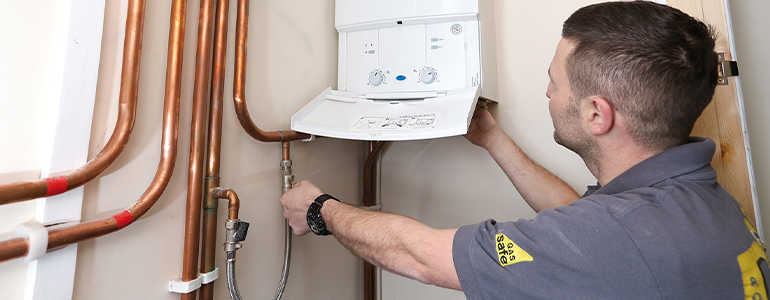Most homes in the UK have some kind of gas appliance. While they are convenient in many ways, they can pose a serious hazard if left unchecked. Unsafe gas appliances have the potential to cause gas leaks, explosions, fires, and carbon monoxide (CO) poisoning. All of this can be avoided by following some basic safety procedures which we talk about in the ultimate guide to gas safety.
What are the Hazards of Using Unsafe Gas Appliances?
Using unsafe gas appliances in your residence can lead to the three main hazards: leaks, fires and explosions and CO poisoning.
1. Leaks
Gas can leak through faulty appliances and old pipes. A distinct smell is added to otherwise odorless gas to help us identify it. Even a minor gas leak can lead to a disastrous explosion or fire if not checked immediately. If you think you can smell gas inside, promptly call an engineer to check out the problem.
2. Fires and Explosions
Gas is highly flammable. It can catch fire in the blink of an eye. Safe appliances and heating devices use gas in a controlled way to heat our homes and let us cook our food. However, even a minor gas leak from a faulty appliance or pipeline can spread quickly if unnoticed and catch fire leading to devastation.
3. CO poisoning
This is the most dangerous gas hazard because you can’t smell carbon monoxide (CO). And you don’t know for a long time that you are suffering from CO poisoning. CO is produced due to the incomplete burning of gas in wrongly fitted or poorly maintained appliances. It can also happen if the exhaust channels are blocked. CO poisoning is a slow process and most of its symptoms resemble that of common flu or a hangover. In case you suspect CO poisoning, immediately call a gas safety engineer to run a check on heating and exhaust systems. And see a doctor immediately to get medical assistance.
Things to Watch Out For
In our ultimate guide to gas safety we recommend getting gas appliances and heating systems tested annually. Or as frequently as mentioned in the manufacturers’ guidelines. While an annual overall gas safety check will ensure everything is working properly, an individual appliance check is what you should get done in case you notice any of the following signs:
- The appliance is not working properly
- It is producing a low, yellow flame instead of a sharp blue one
- There are black or brown marks on or around it
- The pilot light on the heating system’s boiler keeps switching off
- A lot of condensation forming on windows
Who can Conduct a Gas Safety Check?
In the UK, engineers need to be specially certified to carry out different types of gas work. An official list of businesses employing such certified engineers is maintained by the Gas Safe Register. Only engineers issued with a Gas Safe ID Card are qualified to do all types of gas work and conduct gas safety checks.
What Does a Gas Safety Check Involve?
Only a registered Gas Safe engineer should conduct gas safety checks in your home. They will test gas appliances to make sure they are safe to use by verifying the following things:
- The appliances are set and adjusted properly, allowing the gas to burn as it is meant to
- They are suitable for use in the room or area they are placed in
- They are physically stable, fitted securely, and connected properly to the gas supply lines
- There is adequate and continuous air supply for every appliance
- All safety devices like alarms, cut-off switches, and timers are connected and working
- There is no blockage in any vent, flue, or chimney
- Visually inspect the pipelines for wear and tear as best as possible
- Check the entire gas flow network of the house for leaks
To Conclude: The Ultimate Guide to Gas Safety
At Greener Homes, we have several registered Gas Safe engineers who will be happy to conduct a gas safety check at your residence. Call us to book an appointment. Also, reach out to us in case of any gas related emergency. And we promise you, we will waste no time in getting there and helping you out.
